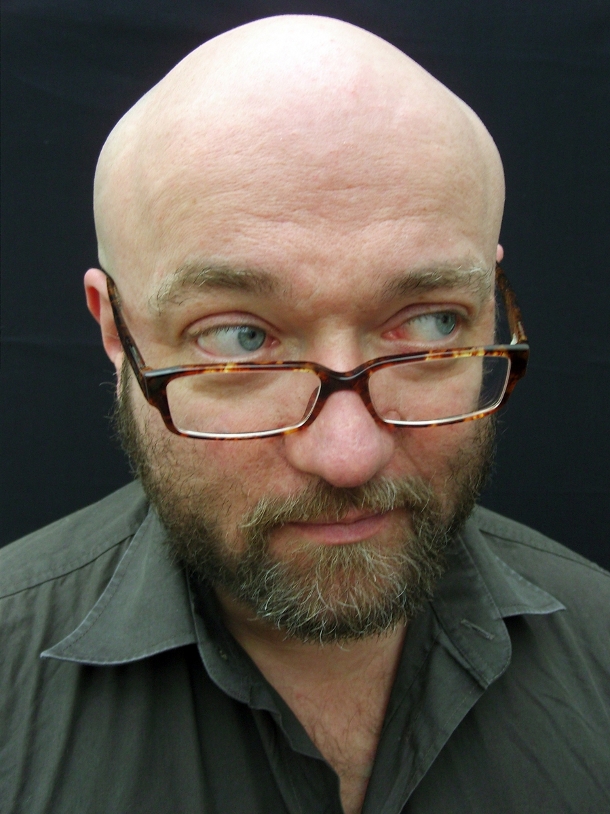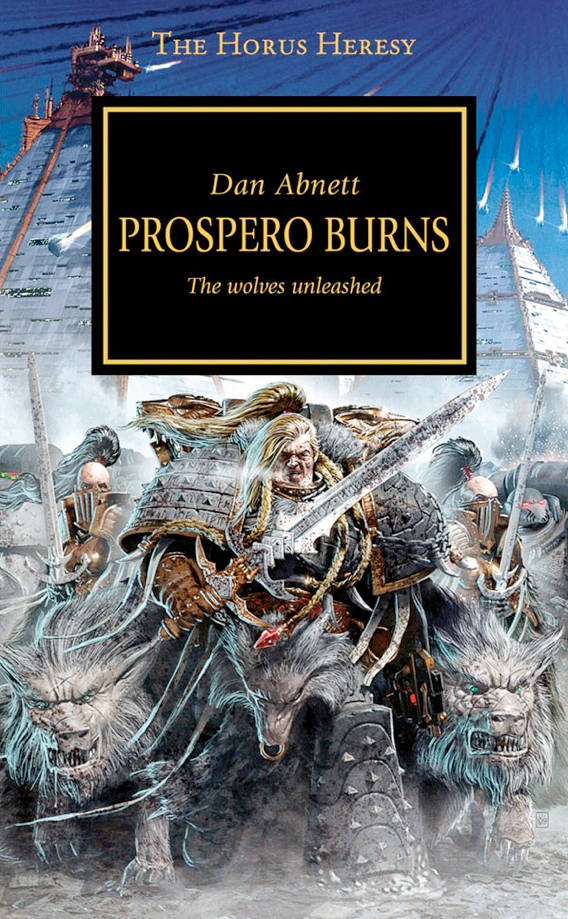We chat comics, novels and Ultramarines with the prolific sci-fi author


Unless you’re the most transient of skim readers, you might have noticed this week is book week on SFX.co.uk – the perfect way for us to kick-start three months worth of bonus book coverage in SFX. Presented here is the first in a series of sci-fi author interviews that will be appearing regularly over the next couple of weeks – this one with top author Dan Abnett whose galaxy of work spans everything from novels and comics to audio books and plays.
.
SFX: Hi Dan, well to start with would you mind telling me a little bit about yourself and how you got into a career as a writer, was this always your intention?
Dan: I was in the third year of an English degree at Oxford, and I wasn’t sure what I was going to do with it. A friend knew I loved comics, and suggested I approach Marvel. Next thing I knew I was on the editorial staff in London, and I started writing freelance. I’ve written comics ever since, but for the last decade, I’ve also written novels - for Torchwood , for Doctor Who , for Primeval , and a large number of them for Games Workshop’s Black Library. With sales there in excess of 1.2 million English language copies, several bestsellers and a mighty fanbase, I suppose that’s what I’m best known for - the Gaunt’s Ghost series, Eisenhorn , the Horus books. But in the states, with my wingman Andy Lanning (as ‘DnA’) I write lots of comics - a five year run on Legion Of Superheroes for DC, Majestic and The Authority , Nova and Guardians and the upcoming Thanos Imperative for Marvel...
SFX: You’re an incredibly prolific author, how do you find the time in the day to write so much? And do you find it difficult jumping between projects so regularly?
Dan: I’m disciplined and I work long hours. Jumping between projects actually helps, because I find that stops me getting buried in one thing. I often write a chunk of novel in the morning and then switch to comics after lunch, followed by an hour or two collating ideas after dinner.
Get sneak previews, exclusive competitions and details of special events each month!
SFX: Do you find writing comics, novels or plays more satisfying? Are there any other areas you would like to expand into, movies or videogames for example?
Dan: Novels, probably. I love writing comics, but prose is the most direct interface with the readers. As for movies and games, I’m already expanding into both, although I’m limited as to which projects I can talk about. The one I can mention is the Warhammer 40K movie, Ultramarines , which I’ve written the screenplay for. It’s animated, and they’re using expression-capture technology on the voice cast, which includes John Hurt, Terence Stamp and Sean Pertwee. Check out the movie’s website at www.Ultramarines.com
SFX: What do you consider to be your biggest achievement to date? Is there anything you’ve done your childhood self would be particularly proud of?
Dan: That’s hard, because it’s different things for different reasons: my first published novel, the first Gaunt adventure, First And Only , because I’d always dreamed of publishing a novel; some of the novels like Necropolis , Eisenhorn and Blood Pact that I think worked especially well; Sinister Dexter , my best known 2000 AD strip, because I created it and have written every single instalment over 15 or so years; my “own” novel Triumff , which is now out from Angry Robot and was long listed for Best Novel by the British Fantasy Society - after 36 novels for other people, I start writing my own...
...I’m pretty sure the kid version of me, who used to draw his own comics, would be most impressed by me writing Warlock , Thanos , Star-Lord and all the other Marvel Superheroes.
SFX: What was the appeal of the Warhammer universe for you and what is it that has kept you writing in that world for more than a decade?
Dan: I was an enthusiastic RPGer when I was in my teens, and used to read White Dwarf in the early days, so there was something terribly appealing and familiar about the IP when it was first shown to me. I suppose I got it, and they needed authors who could capture the particular taste of it. It makes me laugh how many words I’ve added to the 40k lexicon. People use them back to me, and I see them in rulebooks, and I think, “God, I just made that up one Tuesday afternoon”. Why am I still writing it? Because I am so engaged with it, I suppose. I have major, successful series running with characters I am very fond of. I don’t want to step away from that. I’d also like to think that the old “tie-in” stigma is beginning to disappear these days.
SFX: How did your childhood inform the kind of things you’re working on? Were you a Doctor Who fan or a Marvel fan for example before you started working in those worlds? Was science fiction and fantasy a big part of your youth?
Dan: My childhood informed it enormously. I liked stories and I liked to draw. My parents are artists, very creative, and they encouraged me. I liked to read. I read a lot, not just SF and fantasy, but tons of that - Ray Bradbury, Jack Vance, Frank Herbert, Lovecraft, Wyndham, etc. I have been reading a LOT ever since. So I could draw and write stories at the same time, I used to make my own comics, but I soon realised that I couldn’t draw them fast enough. The writer in me left the other bits behind.
SFX: Have you ever considered or been approached to write for the Doctor Who TV series?
Dan: I consider it regularly. One of these days someone might even ask me. You never know your luck.
SFX: What do you think gamers and readers find so attractive about Warhammer and Warhammer 40,000 in particular?
Dan: It’s immersive and distinctly flavoured, and it offers a Universe where people of wide-ranging interests can gather: the model makers, the gamers, the painters, the role-players, the rule-junkies, the fan-fiction writers, the readers, live-action types. When I started working for Black Library, 40K and Warhammer were very “teenage boy” oriented activities. It was all about the tabletop gaming and the models. The fiction broadened that. A boy can still be totally into the model-building, and his girlfriend or his sister can access the 40K universe through a novel. Or vice-versa. Or both.
SFX: Your latest Warhammer 40,000 novel, Prospero Burns , is about the destruction of Prospero, but only tells one half of the story alongside Graham McNeill’s Thousand Sons , how did you go about that process?
Dan: The sack of Prospero is a famous event in the Horus Heresy (the “mythical” civil war that sets up the universe of Warhammer 40,000), and we knew it would need to be covered in the novel series, but we also knew we’d need to do something fancy with it because all the fans know the ending. Graham and I decided to take a side each and tell stories that reflect each aspect. I was hoping Graham would take the Space Wolves (who stick it to the Thousand Sons), because they didn’t interest me very much, until I realised that was precisely why I needed to take them on, so I could engage. We’ve really just batted ideas to and fro. We did that with the first couple of books in the Horus series, where I set up shots for Graham to smash (figuratively). Of course, nothing goes according to plan. In the middle of Prospero Burns , I started to suffer seizures that were eventually diagnosed as late-onset epilepsy, so I had to temper the work a little (that’s why my novel of the pair was delayed) and the wheels rather fell off the process. But we still enjoyed it, and we’d do it again.
SFX: Do you prefer a collaborative way of working or are you more of a lone wolf author?
Dan: I’ve worked with Andy Lanning on comics for 20-plus years, and with other writers like Ian Edginton, Steve White and John Tomlinson, so I think it can often be a very productive process with comics, like the ‘writers’ room’ concept on US comedy shows. Novels are a much more lone wolf process. I think the reason it’s worked on a back-and-forth basis with Graham is that we’re working in the same Universe. The Horus Heresy writers (me, Graham, Jim Swallow, Aaron Dembski-Bowden and selected others) meet regularly at Black Library Towers to plot and plan. We are the High Lords of Terra, and we shall know no fear.
SFX: What are you working on at the moment and what can we expect from you in the future?
Dan : I’m finally bringing in the epilepsy-delayed Prospero Burns so I can get started on the next Gaunt’s Ghosts epic, Salvation’s Reach . I’m writing the six issue cosmic event The Thanos Imperative with Andy Lanning for Marvel. I’m doing new stuff for 2000AD and the Megazine, including a second series of Insurrection with Colin McNeil. I’m also working on my second original novel for Angry Robot. After the alternative-history, fantasy, swashbuckling of Triumff: Her Majesty’s Hero , which I was delighted to see get long listed for the BSFA, will come a piece of hard-assed combat SF called Embedded . Future war setting. Journo gets tele-presently implanted into a frontline soldier to cover the fight. The soldier gets hit. The journo’s mind gets “stuck” in him, and he has to take over and get them both home alive.
There, you see. You want to read it, don’t you?
SFX Magazine is the world's number one sci-fi, fantasy, and horror magazine published by Future PLC. Established in 1995, SFX Magazine prides itself on writing for its fans, welcoming geeks, collectors, and aficionados into its readership for over 25 years. Covering films, TV shows, books, comics, games, merch, and more, SFX Magazine is published every month. If you love it, chances are we do too and you'll find it in SFX.


